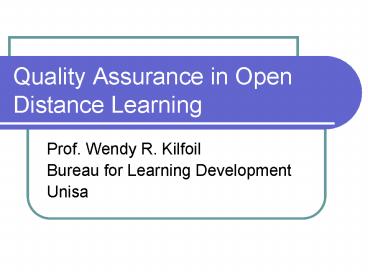Quality Assurance in Open Distance Learning - PowerPoint PPT Presentation
1 / 16
Title:
Quality Assurance in Open Distance Learning
Description:
... distance education programmes in the U.S. at school and tertiary level, public and private ... Accrediting Commission's decision and recommendations. 23-25 ... – PowerPoint PPT presentation
Number of Views:544
Avg rating:3.0/5.0
Title: Quality Assurance in Open Distance Learning
1
Quality Assurance in Open Distance Learning
- Prof. Wendy R. Kilfoil
- Bureau for Learning Development
- Unisa
2
Outline of presentation
- Clarification of terms
- Distance education in the U.S.
- Distance Education and Training Council
- Quality Assurance Agency in the U.K.
- Distance education in S.A.
- Unisas accreditation experience
- Guidelines for institutions
- Suggestions to HEQC
3
Quality control
- Responsibility of academics to build in quality
controls - Use methods and design activities that lead to
quality outcomes - Academics knowledge, enthusiasm, use of
appropriate media, monitoring of student
progress, planning and instructional design
4
Quality assurance/ quality management system
- Management responsibility
- Put in place mechanisms and standard procedures
to ensure that quality control is working. - Harman (1998, p.346) quality assurance refers
to systematic management and assessment
procedures adopted to ensure achievement of
specific quality or improved quality, and to
enable key stakeholders to have confidence in the
management of quality and the outcomes achieved.
5
Quality assessment
- External agency
- Middlehurst (1992, pp.28-9) judgment of
performance and outcomes against certain criteria
or objectives, in order to establish whether the
required standard has been achieved, and if
failures or shortfalls occur, to ensure that they
are corrected.
6
Quality audit
- External agency and institutional responsibility
- SAQA (1998)the process of examining the
indicators which show the degree of excellence
achieved. - Alderman (1996, p.185) Audit is a powerful
instrument of change, but it is not a measure of
quality. It does not, for example, compare
standards of degrees, or make judgments as to the
quality of teaching.
7
Accreditation
- Certification
- CHE (2002. p.9) Accreditation signals that
programmes that lead to registered qualifications
achieve set standards, conduct their activities
with integrity, deliver outcomes that justify
public confidence and demonstrate accountability
for the effective use of public or private funds.
It allows government to invest public funds with
confidence in programmes that demonstrate their
ability to pass through a process of rigorous
external scrutiny.
8
Accountability and improvement
- Higher education
- costly to nation, parents and students
- decisive factor in the economic success of a
nation - social impact
- iproves the quality of life of graduates
- Accountability
- not control
- does not undermine the autonomy of the
institution - Improvement or enhancement of the educational
inputs, processes and outcomes - feedback loop from quality assurance or
accreditation process
9
Distance education in the U.S.
- Regional and national accrediting agencies, all
with standards for distance education - Standards often focus online distance education
as it was the progress of technology that
stimulated the growth of the industry. - Distance education expected to produce equivalent
outcomes and meet the same standards as
traditional, campus-based programmes - Non-governmental
- Focus improvement
10
Distance Education and Training Council
- Accredits all distance education programmes in
the U.S. at school and tertiary level, public and
private - Accredits internationally
- Member participation in standard setting
- New emphasis on outcomes assessment
- Non-governmental
- Focus improvement
11
Quality Assurance Agency in the U.K.
- Contact and DE
- Non-governmental
- Members participate in standard setting
- Increasing database of standards for specific
disciplines - Assumes the OU model with tutors and regional
offices - Standards for online
- Distance education should provide an equivalent
experience to contact tuition - Focus improvement
12
Distance education in S.A.
- HEQC
- Initial neglect of distance education
- SAIDEs criteria
- Audit and accreditation
- Governmental
- Focus accountability
13
Unisas accreditation experience
- DETC accreditation 2002
- Methodology
- Self-evaluation report
- Preparatory visit
- Pre-visit activities student surveys, materials
evaluation - Examining panel
- Response to chairpersons report
- Accrediting Commissions decision and
recommendations
14
Guidelines for institutions
- Institute a system of data and management
information collection and include a feedback
loop that will enhance the quality of the
learning experiences of students. - Place quality assurance of academic programmes
under the control of the Senate. - When drawing up the SER, wide participation and
team work are essential. - Draw up an outcomes assessment plan
- assessment of students by academics
- assessment of academics and programmes by
students - national and international benchmarking
- Get involved in setting standards and serve on
examining panels. - Guard your autonomy move the system towards self
regulation and quality improvement.
15
Suggestions to HEQC
- Involve the higher education community in drawing
up standards and serving on examining panels. - Integrate with the SAQA system and use the
outcomes of registered qualifications in
evaluating programmesBe sensitive to context and
the individual institutions mission in order to
foster diversity. - Include distance education guidelines in
standards. - Define the role of professional bodies.
- Run annual workshops for training evaluators,
planning self studies, etc. - Apply the self study, site visit, peer evaluation
system used internationally. - After the first accreditation, allow institutions
to opt for a comprehensive study with emphases or
a focused self study. - Use a flexible system with more set questions for
an original accreditation visit, and more
self-generated questions for future visits. - Make accreditation about quality improvement not
control.
16
Conclusion
- Morrison, Magennis Carey (1995, p.129)
universities are being encouraged to report
simple, readily available quantitative measures
at the expense of complex qualitative assessments
of the quality of higher education, based upon
professional judgments. - Improvement the focus not merely accountability
and control.































